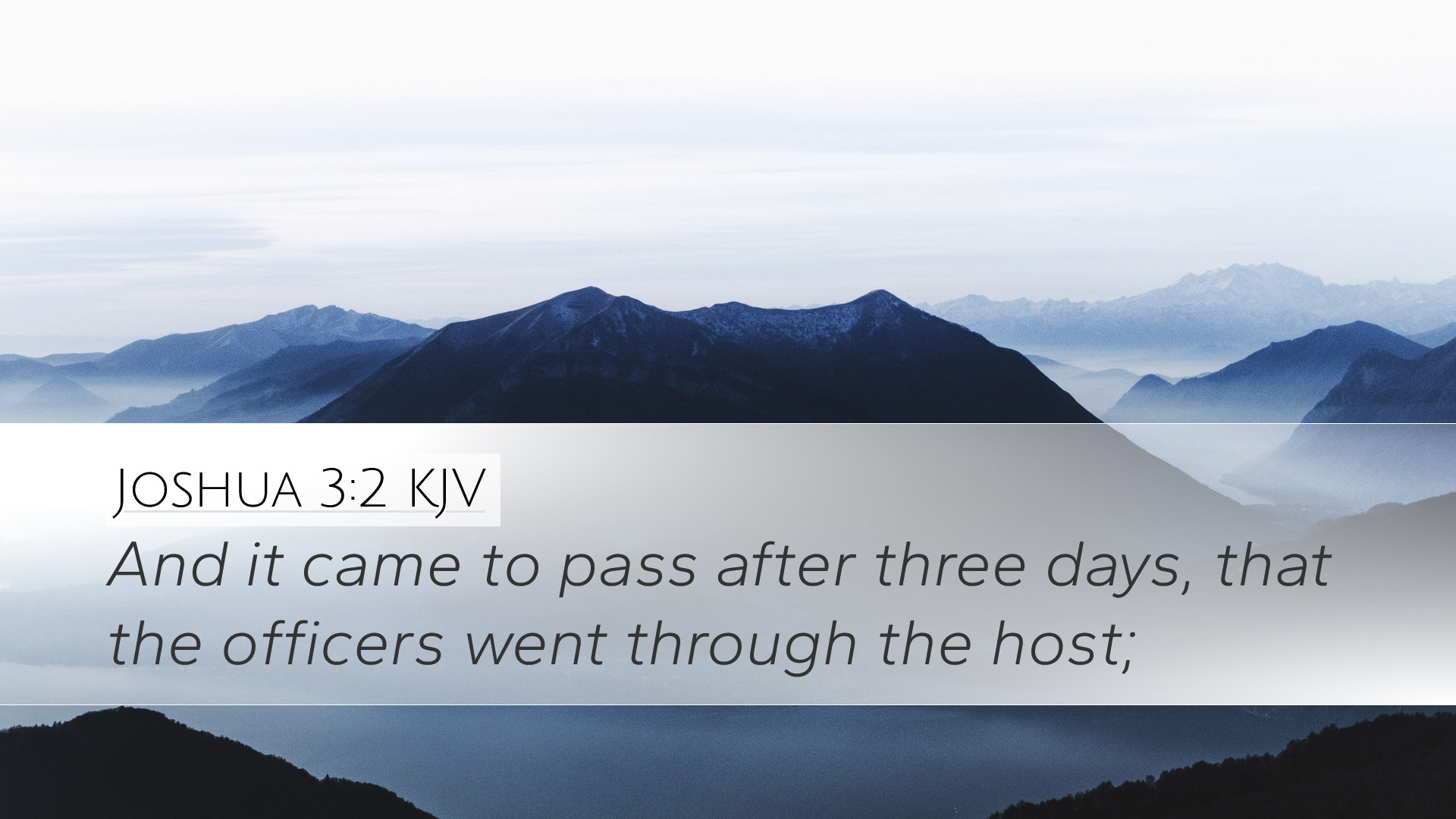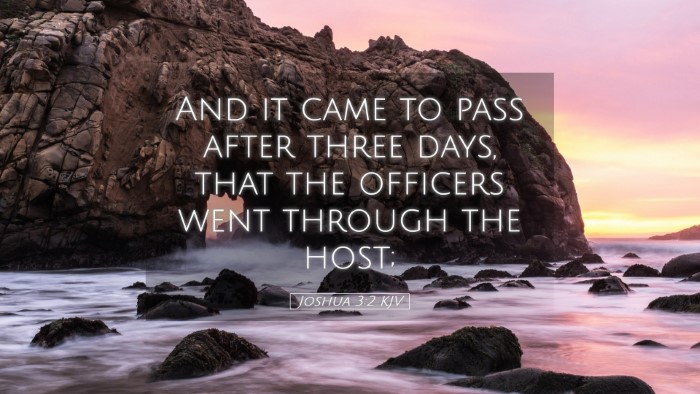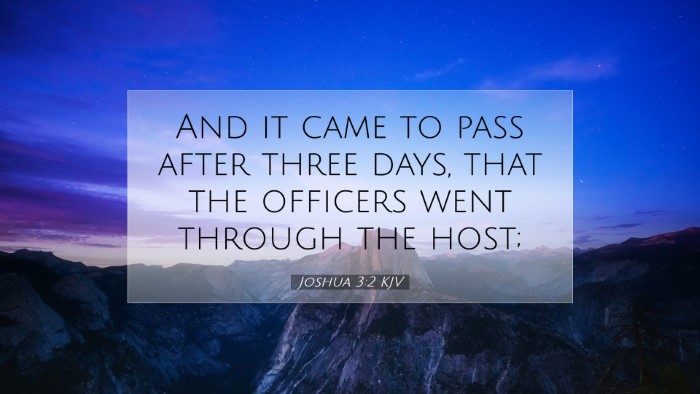Old Testament
Genesis Exodus Leviticus Numbers Deuteronomy Joshua Judges Ruth 1 Samuel 2 Samuel 1 Kings 2 Kings 1 Chronicles 2 Chronicles Ezra Nehemiah Esther Job Psalms Proverbs Ecclesiastes Song of Solomon Isaiah Jeremiah Lamentations Ezekiel Daniel Hosea Joel Amos Obadiah Jonah Micah Nahum Habakkuk Zephaniah Haggai Zechariah MalachiJoshua 3:2
Joshua 3:2 KJV
And it came to pass after three days, that the officers went through the host;
Joshua 3:2 Bible Commentary
Commentary on Joshua 3:2
Joshua 3:2 states, "And it came to pass after three days, that the officers went through the host;" This verse marks a pivotal moment in the narrative of Israel's journey to the Promised Land. This commentary aims to explore various insights gleaned from esteemed public domain commentaries, particularly focusing on the significance of this passage for pastors, theologians, and scholars.
Context and Background
To fully appreciate the importance of Joshua 3:2, it is essential to understand the historical and theological context in which it occurs. After spending forty years in the wilderness, the Israelites were on the brink of entering Canaan. The leadership of Joshua, succeeding Moses, is noteworthy as God establishes him as a strong figure to guide His people into the land promised to their ancestors.
The Three Days of Preparation
The mention of "three days" is particularly significant. According to Matthew Henry, this timeframe served as a period of preparation and purification for the Israelites. Just as the Lord commanded Moses to prepare the people prior to receiving the Ten Commandments (Exodus 19:11), here, three days symbolize an opportunity for contemplation and readiness. This period allows the Israelites to emotionally and spiritually align themselves with God's purpose.
Albert Barnes emphasizes that this waiting period fostered a sense of anticipation among the people, a necessary element in their faith journey. During these three days, the officers likely communicated the importance of following divine instructions, paralleling their previous experiences with God's faithfulness and guidance.
The Role of the Officers
The verse highlights the role of the officers as key leaders responsible for disseminating information and instructions among the tribes. Adam Clarke elaborates on the function of these officers, suggesting that they were appointed to manage the logistics of crossing the Jordan River. By their going through the host, they instilled both order and unity, reminding us that leadership in God's people is about serving and equipping others for collective movement towards divine promises.
- Organizational Leadership: The officers exhibited the characteristics of effective leaders, crucial in times of transition.
- Communication: They effectively communicated God's directives, emphasizing the importance of clear guidance in a community of faith.
- Community Cohesion: Their efforts helped maintain morale and unity among the tribes as they prepared to take a significant step into their destiny.
Theological Implications
This simple yet profound verse conveys deep theological implications regarding God's desire for His people to be prepared and expectant. The act of waiting is often seen negatively in our fast-paced world; however, the Biblical narrative shows that waiting is frequently a divine strategy. This three-day wait was not merely a delay but an opportunity to engage in reflection, community, and excitement about the tremendous work God was about to do.
The Call to Holiness
The journey into the Promised Land required the Israelites to be set apart, which is underscored in the preceding chapters. Matthew Henry notes that preparation for entering Canaan involved moral and spiritual readiness, reminding us that entering into God’s promises calls for a life characterized by holiness.
The Element of Faith
Furthermore, this verse invites readers to consider the essence of faith. God instructed His people to move forward, but they had to trust Him in the waiting, reflecting a significant theme throughout Scripture. Albert Barnes asserts that this period of waiting tested their faith, echoing themes found in later New Testament texts, where believers are called to wait expectantly for the fulfillment of God’s promises.
Application for Today’s Believers
As we reflect on Joshua 3:2, there are several applications for contemporary believers:
- Preparation for God's Leading: Just as the Israelites prepared to enter the Promised Land, we too must prepare our hearts and minds for God’s leading in our lives.
- Embracing the Waiting Period: In moments of waiting, we have the opportunity to develop deeper relationships with God and with one another, fostering a community grounded in faith.
- Active Leadership: Like the officers, we are called to lead by serving and communicating God’s will effectively in our circles of influence.
Conclusion
Joshua 3:2 serves as a powerful reminder to approach times of transition with a spirit of expectancy and preparation. Drawing from the insights of Matthew Henry, Albert Barnes, and Adam Clarke, we recognize that God is actively involved in the lives of His people, inviting us into a dynamic relationship characterized by faith, readiness, and communal support. As we engage with this text, let us strive to cultivate these values in our own lives and communities, trusting in God’s leading as He guides us into our spiritual Promised Land.


